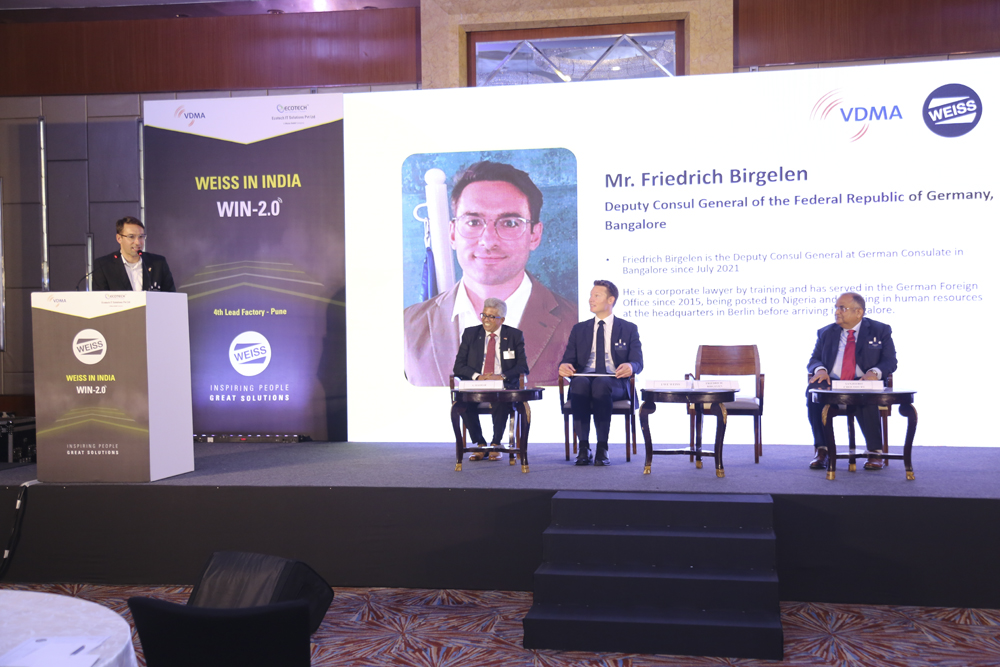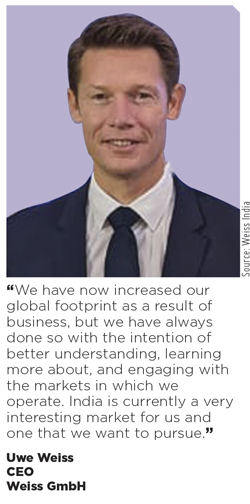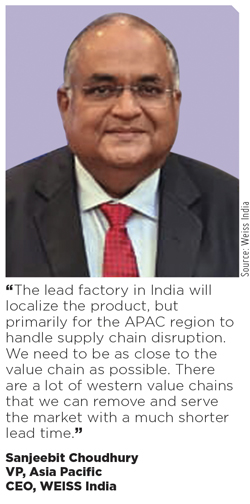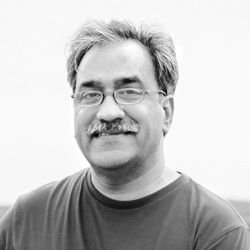Partnering for Growth

Weiss GmbH and Weiss India team, along with German Engineering Federation (VDMA), hosted a Media Round Table interaction on the theme ‘Weiss in India – WIN 2.0’ on October 12, 2022, at Sheraton Grand Gateway Hotel, Bangalore. Excerpts from the event that discussed future plans of Weiss Group in India…
Weiss Automation Solution India Pvt Ltd, the Indian subsidiary of Weiss GmbH, the German-based, world’s leading manufacturer of Automation Solutions, has housed under one roof Weiss APAC regional HQ, India Sales Office, and the Engineering Knowledge Centre since setting up its new campus in Chakan Pune in March 2020. Weiss Group has increased its investments and operations in the region as part of its growth plan and strategy for the Indian and Asia Pacific markets.
“We have now increased our global footprint as a result of business, but we have always done so with the intention of better understanding, learning more about, and engaging with the markets in which we operate. India, in my opinion, is currently a very interesting market for us and one that we want to pursue,” stated Uwe Weiss, CEO, Weiss GmbH at the Bangalore Media Round Table interaction. According to him, India is the foundation for the company’s access to the APAC region, and the entire region will see exciting future development.
Other dignitaries present for one-to-one media interaction were Ingo Nenninger, Group CFO; Sanjeebit Choudhury, Vice President – Asia Pacific, CEO, Weiss India; Friedrich Birgelen, Deputy Consul General, German Consulate in Bangalore; and influential industry leaders from the Automation sector.
Opportunities in Indian Market
According to the International Monetary Fund (IMF) report, India is expected to grow at a 6.8 percent rate this fiscal year and at a 6.1 percent rate in 2023, putting India far ahead of the US, China, Germany, Japan, and the UK, among other major economies around the world. As a result, confidence in India has grown. “In short, the IMF concludes that the worst is yet to come, and 2023 will feel like a recession for many people,” said Birgelen.
He shared snippets of good news, sensing an opportunity in the crisis, particularly in the trade relationship between India and Germany. First, the Asia Pacific region’s emerging economies, including India, have proven to be crisis resistant; second, growth in Asia and Pacific is expected to be moderate amid an uncertain global environment; and finally, the level of automation in Indian industry is low, creating a massive opportunity for growth. “The All India Council for Robotics and Automation estimates yearly growth of 10 percent,” he explained. “The PLI scheme, which stands for Production Link Incentives, is a US$27 billion program by the Indian Government to incentivize those who contribute to the optimization of some Indian industries.”
Also required to look beyond China because of supply chain problems and geopolitical issues, Germany is looking to India as an alternative, as well as for skilled labor and talent intake.
According to the International Monetary Fund (IMF) report, India is expected to grow at a 6.8 percent rate this fiscal year and at a 6.1 percent rate in 2023, putting India far ahead of the US, China, Germany, Japan, and the UK, among other major economies around the world. As a result, confidence in India has grown.
 Relying on India’s growth
Relying on India’s growth
Weiss India has even more to look to leverage and find applications in the critical segment as India becomes the world’s fourth-largest vehicle market. Stating that the Indian market is highly competitive, that quality and precision will be essential for automotive and components, and that the indexing function is fundamental to any discrete manufacturing, Choudhury mentioned, “India is such a vast country, both in terms of size and industry. So we want to really engage. We have been talking about expanding the bucket by educating people and experimenting with them through partners because automation will continue to advance, and the automotive market will grow.”
Even though the Automotive sector accounts for half of the company’s revenue, Choudhury noted that the majority of the company’s revenue comes from other sectors, which have been boosted by Government initiatives such as Atmanirbhar Bharat, Make in India, and the PLI Scheme. “The six sectors, important to us after the 14 sectors of the PLI scheme, include Automotive, Auto Components, Electronics, Telecom, Healthcare or Pharma, and Electric Vehicle Ecosystem. These segments account for 90 percent of our business,” he revealed.
On India’s electric vehicle (EV) market, Weiss remarked, “Many companies see it as a market trend, so big OEMs have massive product launch programs to attract customers. This creates many business opportunities. We might see different parts of engines, fuels, or EV alternatives, but the underlying factor will be mobility and car connectivity.”
 The global sourcing center
The global sourcing center
Pune, India, is designated as one of Weiss World’s four ‘Lead Factories’. Weiss has now established the ‘Solution Factory’ and ‘Global Sourcing Centre’ at the Weiss Campus in Chakan, Pune. “The lead factory in India will localize the product, but primarily for the APAC region to handle supply chain disruption,” Choudhury asserted. “We need to be as close to the value chain as possible. There are a lot of Western value chains that we can remove and serve the market with a much shorter lead time.”
“‘Made in Weiss’ is our philosophy. It makes no difference where you produce; Weiss quality is required. By establishing a global sourcing center and having SMEs certified by a global company, not just for supplying to India, it provides a much better platform for attracting people and motivating SMEs. Furthermore, the quality level expectations will differ from those of India, and on an economic scale, we will be able to negotiate a better deal,” he added.

MURALI SUNDARAM
Correspondent
Magic Wand Media Inc
murali.sundaram@magicwandmedia.in



 Facebook
Facebook.png) Twitter
Twitter Linkedin
Linkedin Subscribe
Subscribe